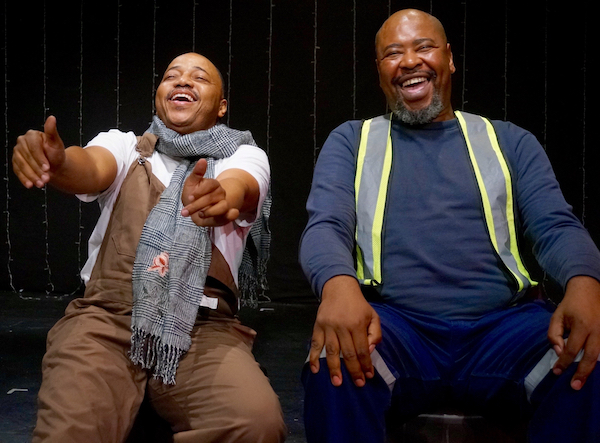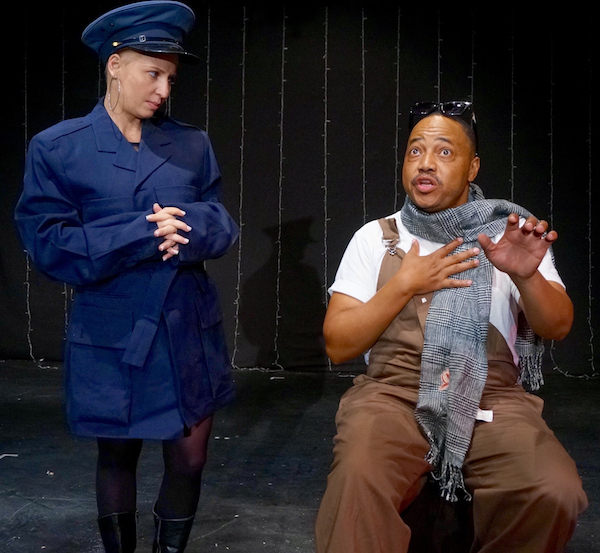 Ever since Johannesburg’s Theatre on the Square opened 24 years ago, it’s felt like a little white enclave.
Ever since Johannesburg’s Theatre on the Square opened 24 years ago, it’s felt like a little white enclave.
Many of the shows have a universal appeal, but the audience that attends its productions in Sandton is mostly middle aged, middle class, and lacking in melanin. That’s undesirable from a social cohesion imperative and untenable on the financial side, and founder and owner Daphne Kuhn has been eager to correct the imbalance.
The current line-up of shows reflects a definite desire to broaden its appeal and, more importantly, to grow the audience base by presenting shows that will appeal to the young black demographic, because that’s the future of the country.
Cue the arrival of Call Me Crazy, a satirical social commentary written, directed by and starring Josias Dos Moleele in a joyfully fluid blend of Zulu, English and Afrikaans. Last month the theatre staged Jobe, a humorous but biblical morality tale starring an all-black cast and also directed by Moleele. Coming soon is the young comedian Ndumiso Lindi in a one-man show, Boys Don’t Cry In July.
 The theatre must attract a younger, larger and more diverse crowd to survive in an environment where it receives no support from the state, says Kuhn. She’s expanded the repertoire from its strong slant towards drama to include more comedy and concerts, and anything else that might put bums on seats.
The theatre must attract a younger, larger and more diverse crowd to survive in an environment where it receives no support from the state, says Kuhn. She’s expanded the repertoire from its strong slant towards drama to include more comedy and concerts, and anything else that might put bums on seats.
It’s a dilemma playing out across the country, but Sandton theatre at least has a fighting chance because of the potentially large untapped market it has previously failed to woo. That’s not entirely the theatre’s fault, since it’s a self-fulfilling cycle. Black playwrights and performers largely steer clear of the Theatre on the Square because their potential audiences don’t go there.
This new alliance with writer, director and actor Josias dos Moleele could be instrumental in sparking that change. He’s previously staged Call Us Crazy in a rougher iteration at the Market Theatre, but he wanted to raise the vibe. “It’s a lovely theatre,” he says, and once you’re in its subterranean bar designed like a plush jewellery box, you could be anywhere.
The play tells the story of Oompie in a series of witty and satirical sketches. The giant and imposing Sello Sebotsane plays the oppressed road construction worker who bravely breaks free to form his own company, then gradually slides into corruption by pocketing a lucrative government tender and failing to pay his workers. There are scenes in parliament, in the townships and on the highways, all linking together to show the rise and moral ruin of Oompie. It’s a story well familiar in South Africa, where even the best intentions are led astray by the festering criminality around them.
 Moleele plays several roles, excelling as an unctuously corrupt government official and an endearingly dim labourer, and making each character entirely believable. The pixie-like Marietjie Bothma is a multi-lingual gem who plays a variety of roles around them. She charms the audience by joking and singing in Zulu then switches to clipped English to mimic newshound Redi Tlhabi as she grills Oompie to investigate how he turned from an honest worker into a corrupt jet-setter.
Moleele plays several roles, excelling as an unctuously corrupt government official and an endearingly dim labourer, and making each character entirely believable. The pixie-like Marietjie Bothma is a multi-lingual gem who plays a variety of roles around them. She charms the audience by joking and singing in Zulu then switches to clipped English to mimic newshound Redi Tlhabi as she grills Oompie to investigate how he turned from an honest worker into a corrupt jet-setter.
Now the audience is pulled into the action too, and Moleele pops up from amongst us to harangue Oompie. We expect such behaviour from a white boss, he yells, but you – a black man – how can a black man cheat his own?
Call Me Crazy is a fast-paced, charmingly unpolished exuberant romp, and while I didn’t understand it all, it’s easy enough to follow the story and there’s enough humour in all the languages to keep everybody laughing. It’s more than a comedy though, with social commentary that gives it bite and relevance beyond the laughter.
The mid-week audience was meagre and mixed, but there’s one vital difference. Most whities keep their reactions low on the emotional Richter scale. We’ll laugh, but rarely guffaw. We might tut or wince, but we do it quietly, and if the spotlight is on us, we’ll actively cringe. We don’t react with uninhibited glee, never yell our disapproval at a dodgy character and certainly never ululate. Not ever.
So my worries that a small audience would hinder the play’s impact were groundless. The theatre was a quarter full but twice as lively as usual, and the atmosphere was magical. The actors pick up on that too, of course, and everyone has a better time for it.
Moleele says that writing a show with multicultural appeal is challenging precisely because the different races act and react differently, and he’s often still surprised at which lines trigger what responses. Advanced ticket sales are tricky too. “Computicket isn’t a black thing,” he says. “Black people will buy tickets from me or on the door, but not online, so you never know how many are going to come.” What should help is that he’s a Performing Arts lecturer at Tshwane University of Technology in Pretoria, so he can encourage a crowd of students to explore a new stomping ground in Sandton.
It was a lovely evening of theatre doing what it does best – breaking down barriers and uniting different people to laugh and think together.
Call Us Crazy runs at Sandton’s Auto & General Theatre on the Square until July 6. Tickets from Computicket. Or at the door.